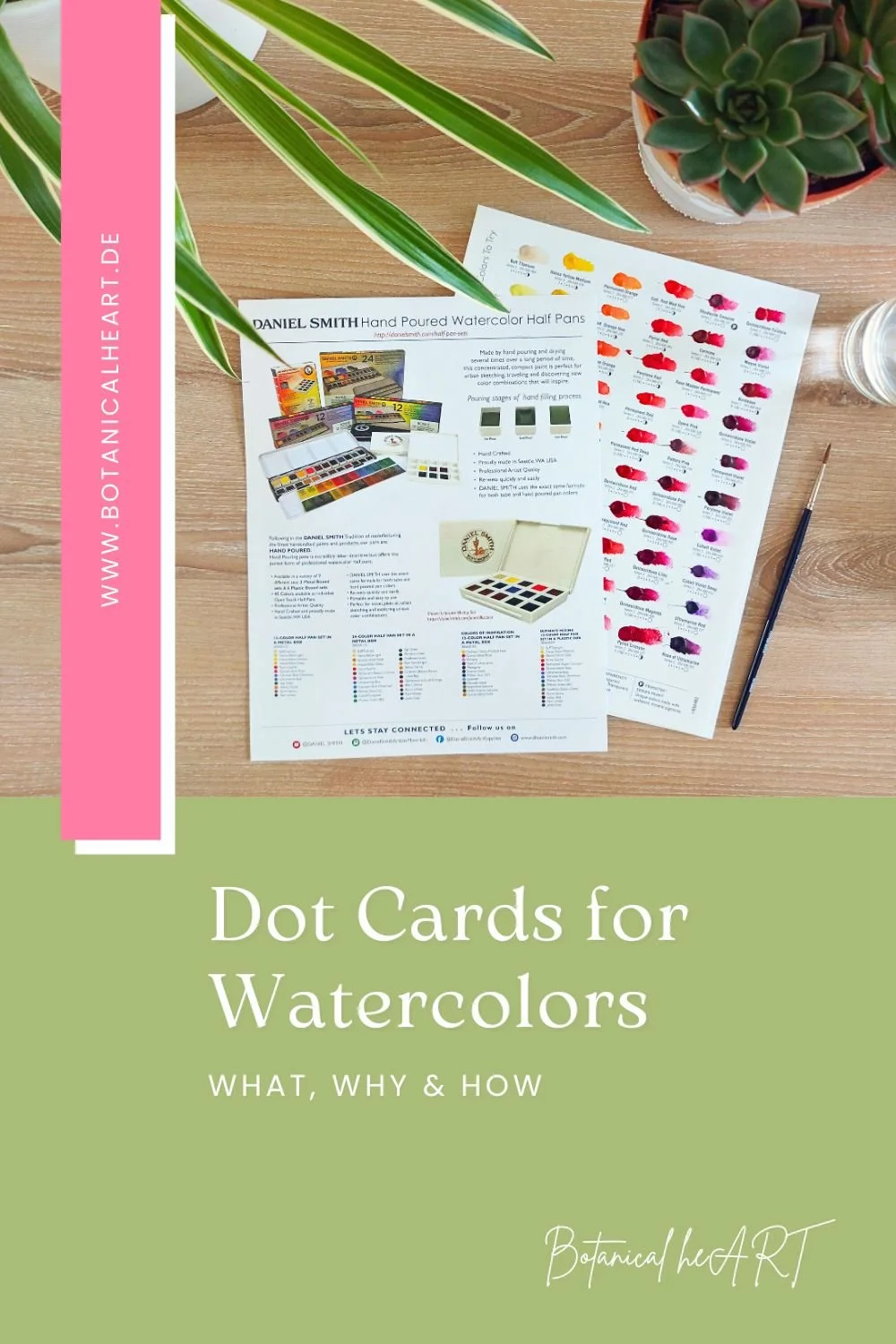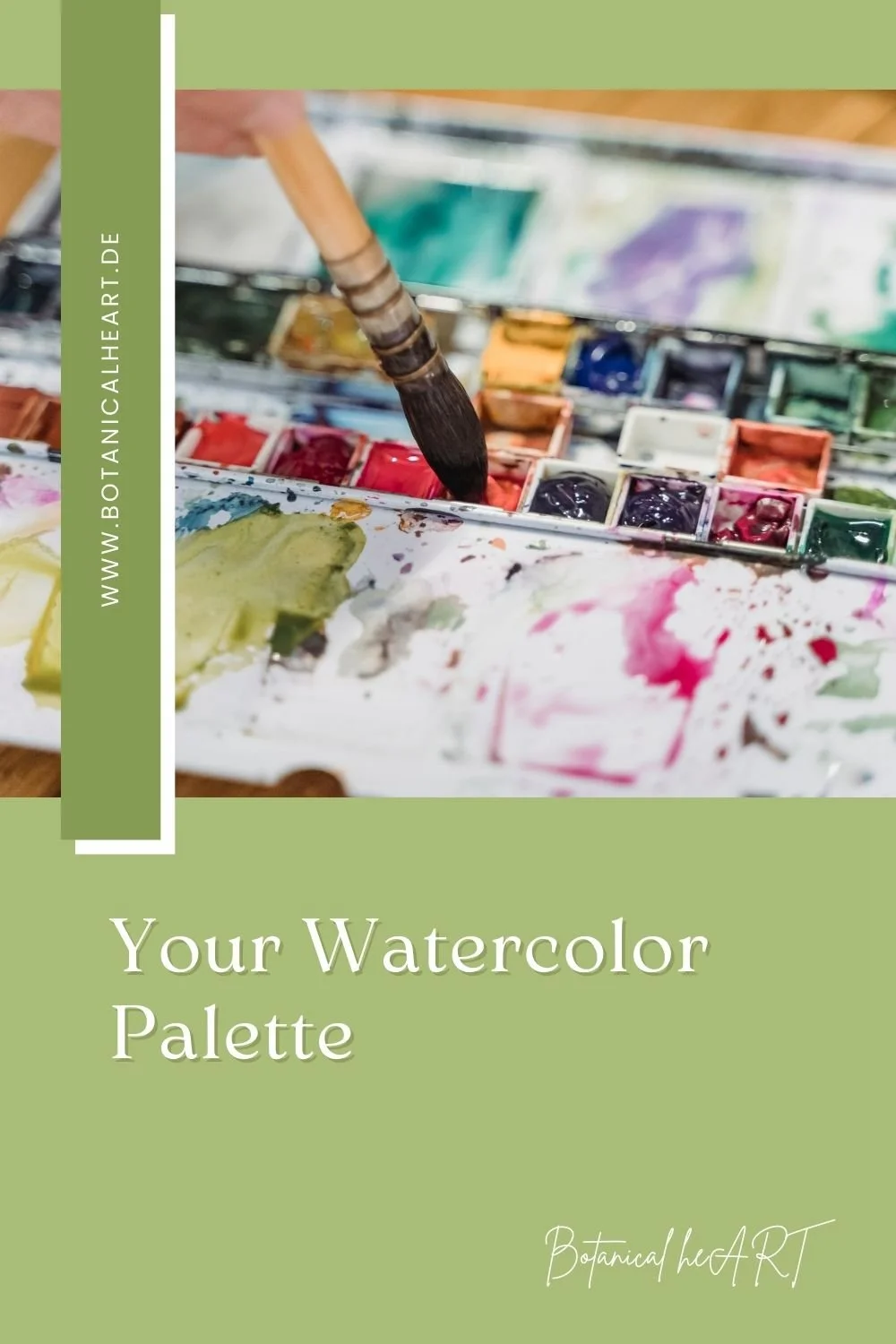High-Quality Watercolors for Botanical Art
You’ve probably noticed that some watercolors shine brightly on paper, while others look rather dull.
Or that some colors blend beautifully, while others quickly turn muddy.
The choice of watercolor paints can make a big difference—especially in botanical art, where fine nuances and transparent layers matter greatly.
That’s why I want to introduce you to a few of my favorite watercolor brands and explain what to look for when buying high-quality paints.
What are the characteristics of high-quality watercolors?
Before we dive into the details of each brand, let’s briefly discuss what makes a watercolor paint “high-quality.”
The differences between premium and cheaper paints are often more noticeable than you might expect.
High pigment content: The core of every watercolor paint is the pigment.
High-quality paints contain significantly more pigment and fewer fillers, which results in richer, more vibrant colors.
This means you need less paint to achieve intense tones.
Lightfastness: If you’ve ever had a painting fade over time, you know how frustrating that can be.
High-quality watercolors are lightfast and retain their color intensity even after years of exposure to light.
Transparency and blendability: Another advantage of premium paints is their transparency.
They layer and blend better without becoming “muddy”—a big plus for the fine details in botanical art.
Tip: When buying paints, look out for lightfastness and pigmentation details, which are often found on the tubes or color charts.
My favorite brands for botanical painting
Here are three of my favorite brands, especially popular in botanical art—and ones I’ve personally tried and use:
1. Schmincke Horadam
Schmincke is a German brand known for its high-quality watercolors, especially the Horadam series in artist quality.
These paints are made in Germany, which is a big plus for me since I like to use regional products.
Schmincke places great emphasis on quality, and it shows: the paints are highly pigmented, layer beautifully, and offer excellent transparency.
Schmincke highlights:
Made in Germany: Personally, I appreciate this because I try to buy local products, even for my art supplies.
High pigment content: The Horadam series is particularly rich in color, so small amounts are enough to produce strong tones.
More affordable student quality: Schmincke also offers student-grade paints with less pigment, making them more affordable—the “Akademie” series. Perfect for beginners or for experimenting.
2. Sennelier
Sennelier is a French brand distinguished by a special ingredient: honey.
This gives the paints a creamy consistency and vibrant brilliance.
For many artists, this is a big advantage, as the paints are easy to pick up from the pan and appear vibrant on paper.
However, I’ve found that Sennelier’s creamy texture can be challenging for me.
Sometimes, I pick up too much pigment because the colors are so strong, leading to a more intense shade than I intended.
Sennelier highlights:
Honey-based: The paints are especially creamy and luminous.
Strong pigmentation: They offer intense color strength, but be careful—you might unintentionally pick up too much pigment!
3. Winsor & Newton
Winsor & Newton is one of the oldest and most renowned watercolor brands, especially popular in botanical art.
The “Professional Watercolour” series offers impressive color depth and variety in artist quality.
For beginners or budget-conscious artists, there is also the “Cotman” series, which is more affordable because it contains less pigment and is classified as student grade.
Winsor & Newton highlights:
Widely used among botanical illustrators, Winsor & Newton has a strong reputation in the botanical art community.
4. Other Quality Brands
An important aspect for me is supporting regional manufacturers.
For me, it not only means shorter transportation routes and thus a lower environmental impact but also supporting local businesses.
And the great thing is: many countries have excellent watercolor manufacturers.
If you live in the U.S., Daniel Smith could be a great option for you.
Another high-quality but pricier option is Shin Han from Korea.
Consider what’s important to you and try different brands and series to find your favorite paints.
A related article you might like: “Creating Your Unique Watercolor Palette.”
For You:
Craft Your Watercolor Palette
Answer 10 questions here and
gain clarity about your needs
for less frustration after purchasing
and more joy while painting!
Of course, the guide is available for free!
Important note: Not all colors are the same!
When you start trying or buying paints, keep the following in mind:
Even if paints from different manufacturers have the same name, that doesn’t mean they’re identical.
For example, “Permanent Alizarin Crimson” from one brand might have a completely different shade than from another.
This is because different pigments can be used. So, it’s worth looking more closely at the pigment information on the packaging before buying.
I also find dot cards very helpful for trying out and getting to know the color properties of different brands.
Here’s a detailed article on the topic: “Dot Cards for Watercolors.”
Conclusion: Experiment and find your favorites
Choosing the right watercolor paints is as individual as each artist.
I’ve discovered brands like Schmincke, Sennelier, and Winsor & Newton for myself, which have become my trusted companions in botanical painting.
But that doesn’t mean you shouldn’t try other brands—at the end of the day, it’s about finding paints that suit your style and make you feel comfortable.
So, grab your brushes and explore the world of watercolor paints—there are so many treasures waiting for you!
Pin this article on Pinterest!




